Prime Minister Justin Trudeau said today he spoke with his Armenian counterpart Nikol Pashinyan this morning to express Canada’s concerns about the war in Nagorno-Karabakh between Azerbaijani and Armenian forces that has raged on for weeks.
Speaking at a press conference in Ottawa, Trudeau said he told Pashinyan that “Canada will continue to work extremely hard with our allies to put an end to the violence.”
“I encourage all sides to engage in dialogue to find a peaceful resolution to the conflict,” Trudeau said.
A readout of the phone call released by the Armenian side said Pashinyan talked to Trudeau about what he called Turkey’s “destructive involvement in hostilities and the unacceptable aspiration to impose its influence in the South Caucasus.”
Pashinyan also thanked Trudeau for suspending the export of military goods to Turkey.
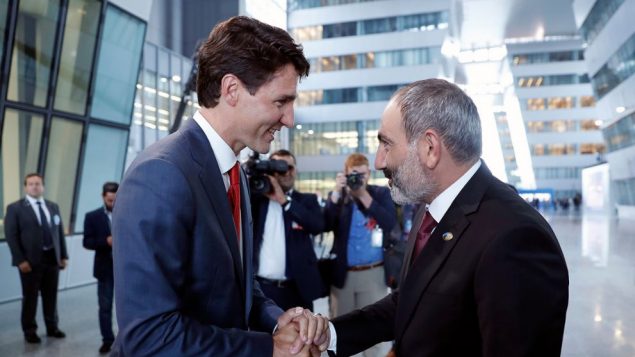
Prime Minister Justin Trudeau shakes hands with his Armenian counterpart, Nikol Pashinyan, during a brief meeting on the sidelines of the NATO leaders summit in Brussels on July 12, 2018. (Press Office of the Government of Armenia)
Armenian authorities have accused Turkey of sending arms — including F-16 fighter jets and combat drones, military advisers and Syrian jihadist mercenaries — to Azerbaijan to fight against Armenian forces in Nagorno-Karabakh. Turkey and Azerbaijan deny these claims.
Two weeks ago the Trudeau government suspended the export of sophisticated Canadian drone technology to Turkey while Ottawa investigates claims that it is being used by the Azerbaijani military against Armenian forces in Nagorno-Karabakh.
Trudeau said the issue of suspended export permits will be one of the things he will be discussing with Turkish President Recep Tayyip Erdogan in a phone call later in the day.
Canada has also called on Turkey to stay out of the conflict in Nagorno-Karabakh.
“I will express how important it is for Canada and for our allies around the world that there be a de-escalation of the violence in the region, and impress upon Turkey how important it is to encourage people to get back to the [negotiating] table and not continue to participate in the violent conflict ongoing right now,” Trudeau said.
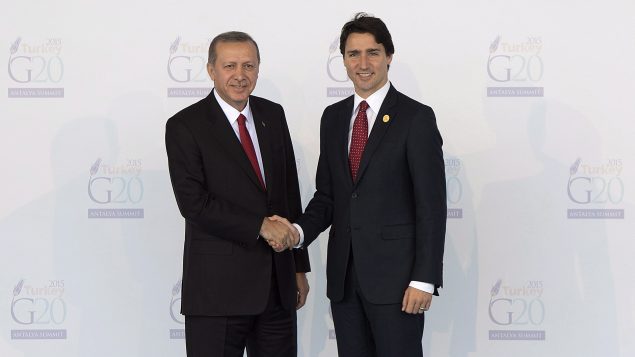
FILE PHOTO: Prime Minister Justin Trudeau is greeted by Recep Tayyip Erdogan, President of Turkey, as he officially arrives to the G20 Summit in Antalya, Turkey on Sunday, Nov. 15, 2015. (Sean Kilpatrick/THE CANADIAN PRESS)
A readout of the call between Trudeau and Erdogan released by the office of the Turkish president said “it is against the [NATO] alliance spirit for Canada to suspend the export of some military products to Turkey.”
Erdogan told Trudeau that the Azerbaijan-Armenia conflict has escalated as a result of Armenian attacks.
“The fact that Nagorno-Karabakh has been under Armenia’s occupation for almost 30 years is the root cause of the Azerbaijan-Armenia conflict,” Erdogan said.
Azerbaijan is conducting its “counter-operation” within its internationally-recognized borders and on its own territory, Erdogan added.
Canada and its NATO and European allies are increasingly worried about the impact of Turkey’s involvement in the Nagorno-Karabakh conflict — which has the potential to draw the rest of the North Atlantic alliance into a military conflict with Russia that has a mutual defence treaty with Armenia.
Speaking to reporters from the Lithuanian capital of Vilnius at the conclusion of his week-long European tour, Foreign Affairs Minister Francois-Philippe Champagne echoed Trudeau’s comments.
“When it comes to Nagorno-Karabakh, we want all external parties to stay out of this conflict,” Champagne said.
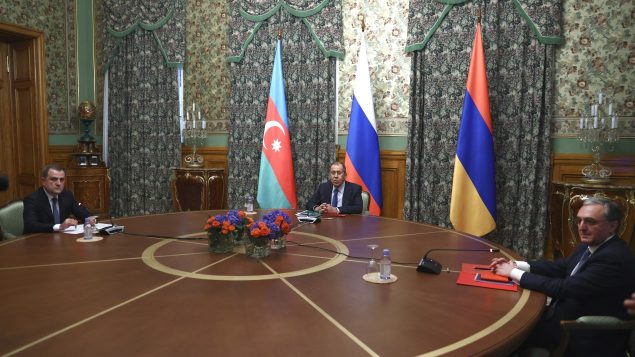
FILE – In this Oct. 9, 2020, file photo released by Russian Foreign Ministry Press Service, Russian Foreign Minister Sergey Lavrov, center, Armenian Foreign Minister Zohrab Mnatsakanyan, right, and Azerbaijani Foreign Minister Jeyhun Bayramov at their meeting in Moscow, Russia. A Russian attempt to broker a cease-fire to end the worst outbreak of hostilities over the region of Nagorno-Karabakh in more than a quarter-century has failed to get any traction, with Azerbaijan and Armenia trading blame for new attacks. (Russian Foreign Ministry Press Service via AP, File)
Russia should use its influence in the region to bring Azerbaijan and Armenia back to the negotiating table, to resolve the decades-long dispute through negotiations, Champagne said.
Armenian community leaders welcomed Canada’s increased diplomatic engagement.
Hagop Arslanian, vice chair of the Armenian General Benevolent Union (AGBU), said that every effort towards the peaceful resolution of the Nagorno-Karabakh conflict and the eventual recognition of the breakaway region is commendable.
“From day one, we have been urging Prime Minister Trudeau to take the initiative of leading extensive diplomatic efforts to put an end to the unjustifiable tragic madness of Azerbaijan with the support of Turkey,” Arslanian said.
“Canada has enough moral authority and international gravitas to rightfully do so as a champion of human rights and dignity.”
Sevag Belian, executive director of the Armenian National Committee of Canada (ANCC), said the Armenian community wants Trudeau “to condemn the Azerbaijani-Turkish aggression and double down on Canada’s firm position, asking Turkey to step down, stop fueling the conflict and immediately withdraw it’s toxic involvement in the region.”
Representatives of the Turkic Assembly of Canada (TAC), which claims to represent interests of Turkic speaking communities in Canada, could not be reached for comment in time for publication.
But in a statement released on Oct. 10, the TAC said it regretted Canada’s decision to suspend the export of Canadian drone technology to Turkey. The TAC statement said the suspension was “obviously due to non-credible propaganda of self-serving Armenian lobbies with no Canada national interests in mind, assuming possible ‘indirect’ human rights violations of Turkey in Karabakh conflict.”
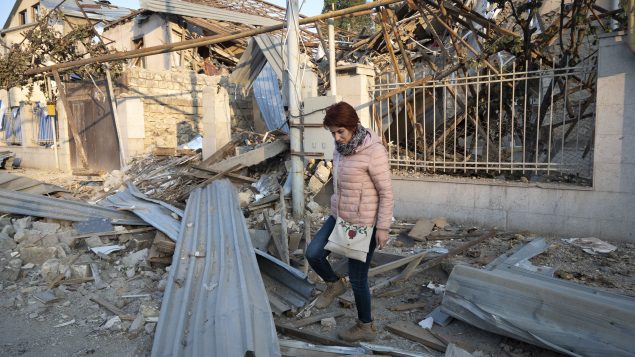
Volunteer doctor Eleonora Ovanesyan walks near her house destroyed by shelling by Azerbaijan’s artillery during a military conflict in Stepanakert, the separatist region of Nagorno-Karabakh, Friday, Oct. 16, 2020. (AP Photo)
Nagorno-Karabakh lies inside Azerbaijan but its majority Armenian population voted to secede from the former Soviet republic as Soviet Union was crumbling in December of 1991.
Azerbaijani authorities never recognized the results of the referendum and their attempts to regain the region by force were defeated by local Armenian forces backed by Armenia.
As a result of the war, which ended with a Russian-brokered ceasefire in 1994, Armenian forces also captured seven districts of Azerbaijani territory that surround the Armenian-populated region.
The war in the 1990s resulted in nearly 30,000 dead and about 1 million refugees.
In nearly 30 years of negotiations shepherded by the U.S., Russia and France through the Organization for Security and Co-operation in Europe (OSCE) Minsk group process, Azerbaijan and Armenia have failed to find a mutually acceptable compromise.
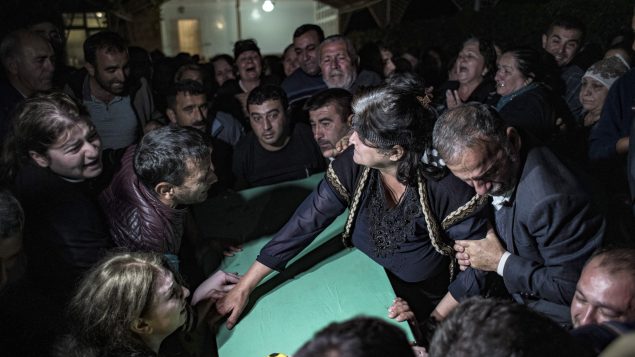
Family members mourn over the coffin of Parviz Orucoglu, a 29 year-old Azerbaijani Turk killed with three others in a shelling in a cemetery by Armenian forces, in the city of Tartar, Azerbaijan, Thursday, Oct. 15, 2020. (Can Erok/DHA via AP)
The Armenian side has insisted on the right of self-determination for Nagorno-Karabakh Armenians, who have governed themselves with economic and military backing from Armenia since the early 1990s. Azerbaijan, in turn, has said that it would never recognize Nagorno-Karabakh’s independence, offering instead a limited autonomy within the country’s boundaries.
Azerbaijan has also demanded that Armenian forces immediately withdraw from Nagorno-Karabakh and surrounding areas captured in the early 1990s.
Since its defeat in 1994, oil-rich Azerbaijan has spent billions of dollars to rearm and retrain its military, purchasing hightech arms from Israel, Turkey and Pakistan, as well as from Russia, which also supplied weapons to Armenia.
Over the last decade, the line of control that separated the Armenian and Azerbaijani forces in Nagorno-Karabakh saw a steady escalation of violence with sniper fire, commando raids and counterraids becoming nearly a daily occurrence.
All out fighting between Azerbaijani and Armenian forces along the entire line of contact in Nagorno-Karabakh began in the early hours of Sept. 27 after Azerbaijan accused Armenia of shelling its positions.
However, many independent experts believe that the scale and the intensity of the Azerbaijani attack suggests that Baku was preparing for military action months in advance.
A Russian-brokered ceasefire that was supposed to come into effect on Oct. 10 never took hold.
In an interview with Turkish television channel A-Haber earlier on Friday, Azerbaijani President Ilham Aliyev said Azerbaijan was ready for a long war and won’t rest until its forces regain control of not only the Azerbaijani-populated districts surrounding Nagorno-Karabakh, but also the entire breakaway region.
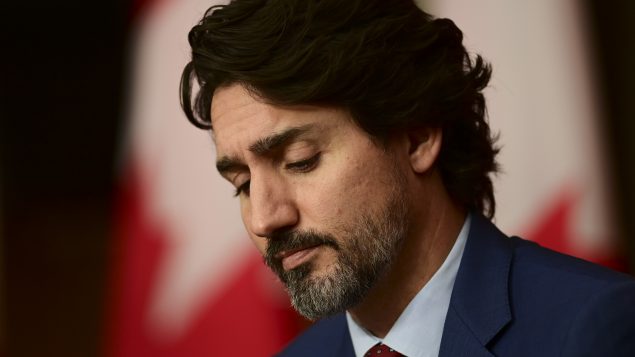






For reasons beyond our control, and for an undetermined period of time, our comment section is now closed. However, our social networks remain open to your contributions.